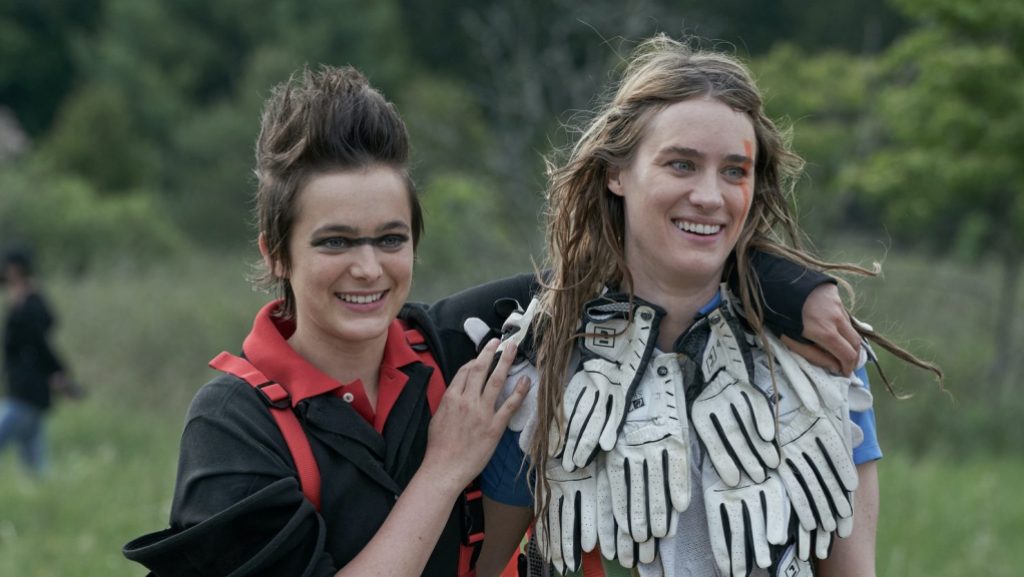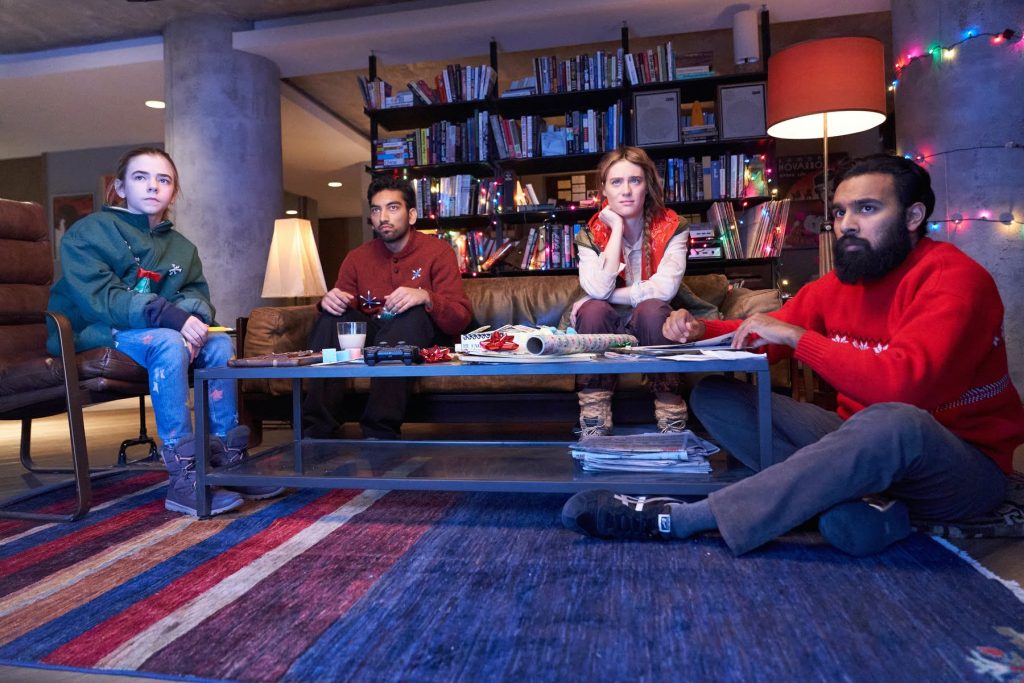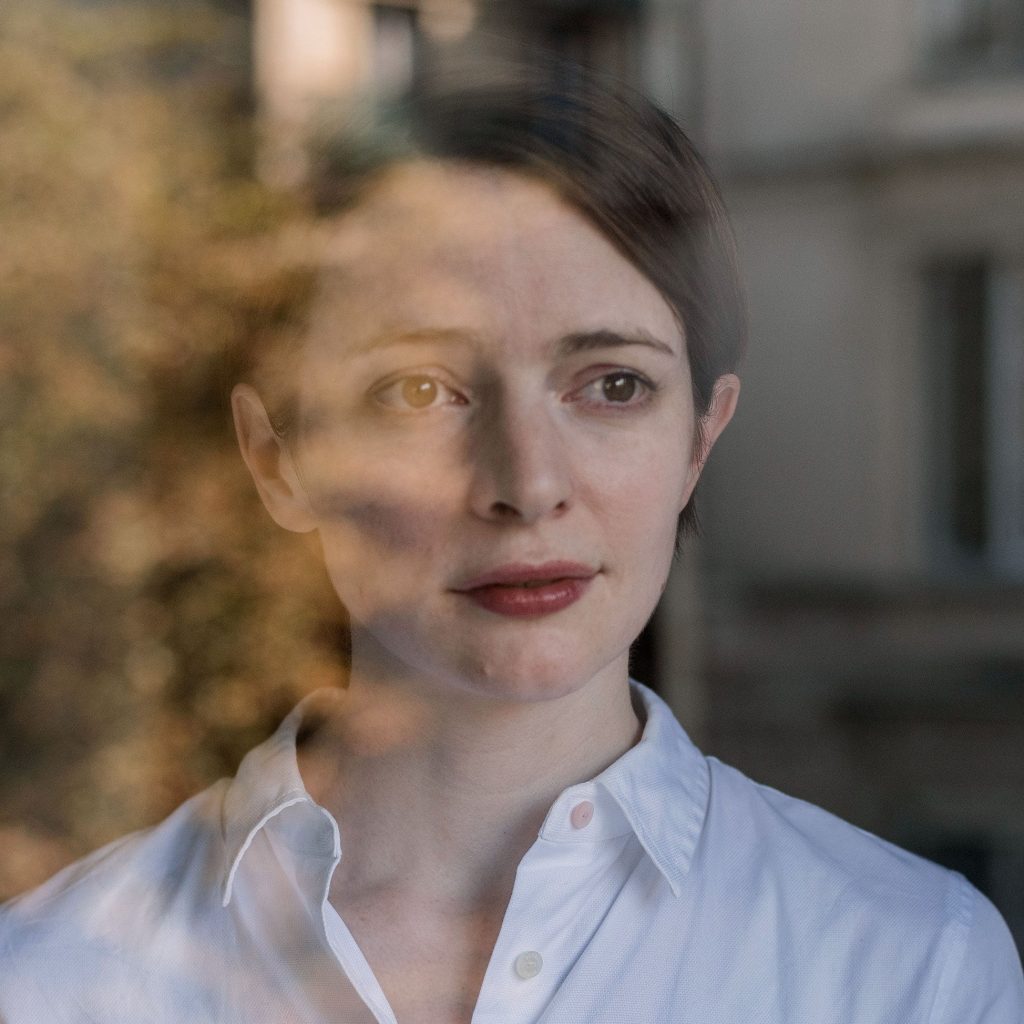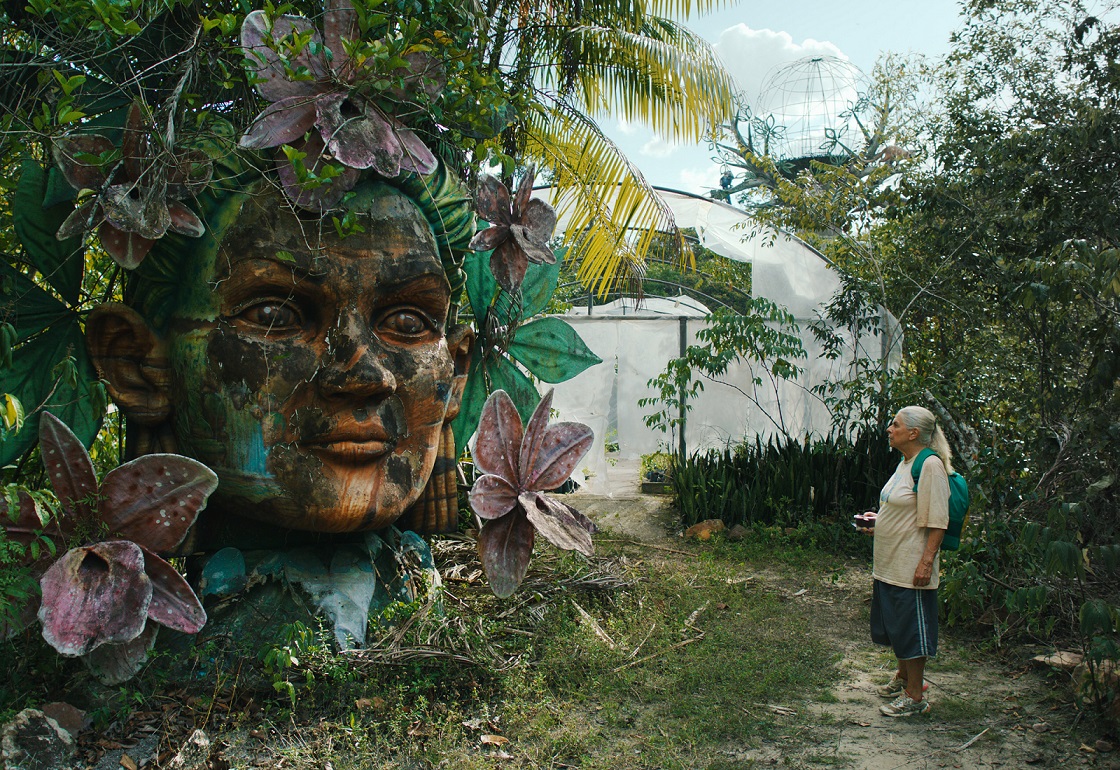
By Emad El-Din Aysha, PhD
The Person is the Politics
Well, that’s enough of that. Let’s get to the relatively more positive stuff. Well, naturally, MD. I loved her voice here. It’s very feminine and cutesy, evidence of a character still traumatized from her childhood. She doesn’t don her thick boyish voice from San Junipero or Halt and Catch Fire. I presume that’s what she sounds like in real life; except when she’s been interviewed by a woman. The long feminine haircut helped her out too, making her more delicate looking, and also brings out her height. You also have to admire her discipline. She starved herself for this role, and you can see it in her face, the bags beneath her eyes. It makes sense given this post pandemic world where they don’t exactly have a lot of food. She also has a very pale complexion, which is as well because it brings out her freckles. Her performance is top notch, lulling you into thinking she’s going to do one thing when in reality she’s planning something else, such as the scene where she stabs the Prophet. I love her confrontation scenes with Elizabeth too. They’re very real and you can see it in her eyes and voice. She’s also really good around Alexandra, a worrying elder sister type full of love and anxiety. Kudos also to her knife wielding skills, learned at the hands of Essex Backyard Throwers.[1]
My only qualm with MD was her showing off too much of her flesh, which you notice in the dream sequence when she seeing Frank’s dead body. Paradoxically she’s wearing trousers there, while previously she’s in shorts, despite the cold and the night and the rain. The younger Kirsten, Matilda Lawler, is as cute as a button and as real as you can get. The desperation and nerves you see in her are phenomenal in the scene where she meets Sarah for the first time. The way her hand moves the knife is almost mechanical. I’m not so sure her thematic character makes sense though but I’m willing to forgive it – trust of strangers. She trusts Jeevan, which is cool if impractical, and then loses her trust of strangers when she meets Sarah for the first time. (Sarah almost threatens to shoot her, again as a stranger). Then she becomes untrustworthy of strangers as an adult and is always armed with knives, and only changes in the last episode.
The kid in the post-apocalyptic movie The Road (2009) learns to trust a family at the end of the story, after his father dies, and he wanted to meet up with them all along, which makes sense. Here it’s not handled consistently, but still Matilda’s charm and acting ability wins you over.

The guy playing Jeevan is good but the character is a mess. The character arch doesn’t make sense. His brother Frank is a cripple and insists on staying his ground in front of the red bandana guy, and so stands in for rootedness, whereas Jeevan wants to go out and forage after the plague has done its worst. Later he settles down himself, after becoming a cripple, using the same-style walking stick as his brother. But, at the same time, Jeevan is portrayed as cowardly and not wanting to go outside – to get the book – and doesn’t know how to hunt and he’s the one who make the mistake of opening the door that lets the red bandana guy in. And he wants to interact with people and is afraid of getting isolated in their cabin, while at the same time not wanting to interact with the women at the hospital. (The scene where the helmet woman finds him, after the wolf attack, is also dulled by her dull comment on what happened to him. Damn art-house frolics!)
The guy playing Arthur is really good, especially in the King Lear scene, and most of the others in the Symphony are heavy duty too, special mention to Alexandra. Very natural and fits her age group perfectly. And she’s quite hot too. The Prophet is a complicated, complicated character and while I think the series fumbled the ball on him – making him a clichéd kid with daddy issues and forgetting the two girl suicide bombers he got killed – he’s one of the highpoints of the series, at the level of acting. (I still don’t understand why he’s angry at Clark, as if the guy stole his father or mother from him, and I didn’t care for Clark that much either. Clark is the main gay character so it’s interesting that they make him out to be small-minded, envious and self-indulgent. Not to mention a drunk and drug user who gives up on alcohol but snorts cocaine in the meantime, and never suffers withdrawal symptoms when he’s locked up in the airport).
Miranda’s character is okay and the performance is well-studied but not terribly engaging and doesn’t make her interesting. The sex scene with Arthur was vapid and lacking in energy. Caitlin FitzGerald is always great to watch, and not just for how sexy she is. She has a lot of poise to her, as a somewhat snooty-nosed celebrity and mother-superior figure, and I liked her even more in episode 3 when she played Elizabeth as a blonde bimbo with surprising emotional depth and humility. She’s good in her confrontation with Tyler at the end too.
At the level of SF the series is good too, with some reservations. The story doesn’t feel scientifically plausible. These people who survived did it by dumb luck, not because they are immune, so that always creates the possibility of the disease rearing its ugly head again. And hardly anybody wears surgical masks in the vast majority of the story, even during the pandemic. The world-building is good however as is the diversification of the post-apocalyptic genre. As my friend Ahmed Al-Mahdi explained to me, the gory scenes in The Black Winter, you have to be ruthless in this world to survive. That’s why Kirsten as an adult is on edge all the time, highly protective, and is always armed. And yet she fails to kill the Prophet – something held her back – and you realize by the end it’s her desire to stop being afraid and start trusting people again; perhaps she sensed how he’s a lot like her. (Strange that she’s so trusting of complete strangers in episode 1). The badguys are the red bandanas, I presume a tongue-in-cheek reference to rightwing militias in the US. (Red for ‘redneck’, maybe?) They certainly are white and dishonorable, using poison and stabbing people in the back, and picking on kids and minority types. There are references, illogical ones, to child soldiers here but art saves the day in the end. (How can Kirsten call them that when she’s never heard of a ‘camcorder’?) The Prophet purges the evil out of his system, catharsis, by playing Hamlet and his army of kids get cured of their blind obedience to him too through the graphic novel. So I guess a deeper understanding of a holy scripture takes you from war to peace. (When you first see them they emerge out of the wheat fields and seem to be all white, like country folk, and their leader doesn’t want humans repopulating the earth and old people running the show all over again; Children of the Corn). Note that Elizabeth, in the end, has her hair done up and this allows you to notice her Islamic-style earrings.
This is good SF and thematics but not necessarily good plotting. The plot keeps getting sidelined, over and over again. Kirsten stabs Tyler, he escapes, she tracks him down and he forces her to keep him alive to save her group, only for her to get poisoned by the red bandanas, only for her to go to the museum of civilization – shades of the decadent library community in Slipstream – and find they are actually okay people and don’t really imprison anybody and that her group actually wants to stay there. (Sarah dying from a heart attack also has no thematic or plot value, except maybe to put an end to post-pandemic wandering, which is hardly nice. Killing off too interesting characters is the oldest one in the book). And the Prophet’s diabolical plan was to destroy the airport with the landmines his kids stole from Gil’s place. (That makes no sense since he put the mines back into the ground, randomly, after the Prophet took his kids. So how did they know where they were to get them out? Did they have metal detector? Is demining that easy?) Gil himself is a testament to the failures of the intellectual class, preaching and telling people what to think instead of teaching them to think for themselves. (Check out Philip Roth’s The Human Stain). Why he loses the kids to the silk-tongued Prophet. Nice in terms of theme but it goes nowhere in terms of plot. That wonderful contrast and standoff between Kirsten and Tyler, protagonist and antagonist, is ruined. After the child soldier scene you have a makeshift graveyard constructed by the Prophet and his minions, I think the names of the Symphony, and previous he’d warned Kirsten that she’s lose everybody. So why doesn’t he fulfill his promises? And how does he go to Gill’s place to do these things while he’s convalescing at his own headquarters, recovering from Kirsten’s stab wounds? Having a sympathetic antagonist who is redeemed in the end is fine too but Kirsten isn’t the one who redeems him and his warnings about the even more evil museum people seem unfounded and illogical, and go nowhere. (Poor Luke Skywalker and Darth Vader. Where’s George Lucas when you need him). And they made him too sympathetic. He really seems to care for the kids, deeply, and understand how to give them hope and so you simply can’t believe that he send them off to their deaths as suicide bombers. He’s also got a crush on Kirsten, having seen her in a Symphony performance, who was does he want to do them harm? Hating the museum makes sense, they represent the Before, but not the Symphony.
There’s cultural problems too. To its credit S11 avoids a lot of tired tropes, like cannibalism and zombies, although I would have preferred a less American presentation of Jeevan’s family. You want to believe that he’s helping her because of his more traditional family upbringing, being Indian, a sense of responsibility and sympathy towards defenseless children. (Just like an Italian American to be honest).[2] From speaking to Canadian friends they tell me their country is all about multiculturalism, accepting people as they are, instead of the assimilation-melting pot model of Americans. So I assume this is something that got lost in the process of adaptation.
The penultimate scene in the last episode is when Miranda calls the pilot of the plane with the flu victims to not disembark so as not to kill the people in the airport. This is really good but in an earlier episode we see Elizabeth’s nanny telling Clark that the airport staff won’t let the people off the plane to stop the infection spreading. And having a survivor get out of the plane in a previous episode makes no sense. He may be immune but how did he survive without food and water the whole time? And how can the plane not have the virus in it, when Elizabeth and Tyler are imprisoned there? Did they clean out the dead bodies off-screen? Did nobody sneeze? Aggghhh!!
Snowflakes of Reason
So, like I said, a mixed bag at the very best. The cinematography is inconsistent too, as is the makeup. Depends on the director in charge of a particular episode, it seems. What a shame. I like loopy storytelling. Check out Pulp Fiction as the classically entertaining case, but a reasonably linear format would have worked better here since this is a TV series, not a compressed movie, and you can afford to take time. Having Kristen visit Frank in his deathbed in episode 7 is wonderful but is blunted by the fact, revealed in the next episode, that it was all a dream, caused by the poison darts. And why did we have her dreaming that she found the antidote, when I presume it was Tyler who saved her? And where are the kids? Did he send them back to his place, the abandoned factory? Did he tell them to go to the museum, and timed it perfectly for him to be there, while Kirsten was unconscious for three whole days? And what does Tyler need his computer device thingy for if he’s planning to destroy the whole airport with landmines anyway?

The series is a mess but, you know what, I can forgive it because of its sincerity and superior characterization. It deserved to be a modern classic on a par with The Weakness of the Bolshevik (2003) but in all cases its way above the competition. I agree with Cynical Reviewer that plot-holes matter a great deal but they are forgivable in certain circumstances. Which is more than I can say for Dune (2021). And, like I said before, I don’t think any of these problems are in the original novel, a prestigious work that won the Arthur C. Clarke Award and almost got the National Book Award. It seems that Emily St. John adheres to the Philip K. Dick school of writing, author of the aforementioned Man in the High Castle. He never stuck to straightforward plots with climaxes and resolutions. He was interested primarily in pushing his characters into a moral situation where some deep and profound transformation happens to them, even if that didn’t necessary drive the plot from that point on. That’s cool, as a PKD fan myself, but I’m not so sure it works entirely in screen adaptations. Watch Heat, the 1995 Michael Mann movie, and you’ll find its all family and relationship drama but perfectly balanced with climactic action and thrilling plot. (Check out TBR Schmitt’s reaction video). The relationships are what tell you about the characters and invest you in the unfolding plot, while the superb plotting builds up tension and stakes for those characters which in turn magnifies the sense of relief or awe at the end.
Same goes for the Egyptian post-apocalyptic series Covid-25. Hence the mounting tension in Station Eleven after the explosion at Gill’s place, which they don’t carry on through. As for why the story is called station eleven, I don’t think it’s because of the book within a book. I think it’s because of the train that you see in the very first episode, when Jeevan is helping Kirsten get home and he gets the bad news about the pandemic. That’s the same train Miranda uses to get to Arthur and give him the graphic novel. It’s all a reference to stations in your life, with the train being fate or the path you choose for yourself.
Check out the opening train sequence in While You Were Sleeping (1995), starring yet another Canadian, Sandra Bullock. Nothing quite like those northern neighbors to the Americans. Am going to check out their SF from this point on, on condition that they get MD to star in every single damn episode!!!
NOTES:
[1] Why did she have to go all the way to England to learn how to throw knifes? Couldn’t they get someone in the US or Canada, or send the English trainers to where they were filming? Talk about non-linear logistics!
[2] Oh, for some reason Elizabeth’s Italian boyfriend – her ‘jealous’ Italian boyfriend – dumps her at the first sign of trouble in the abandoned airport. That wasn’t very nice, on the part of the boyfriend and the producers!






